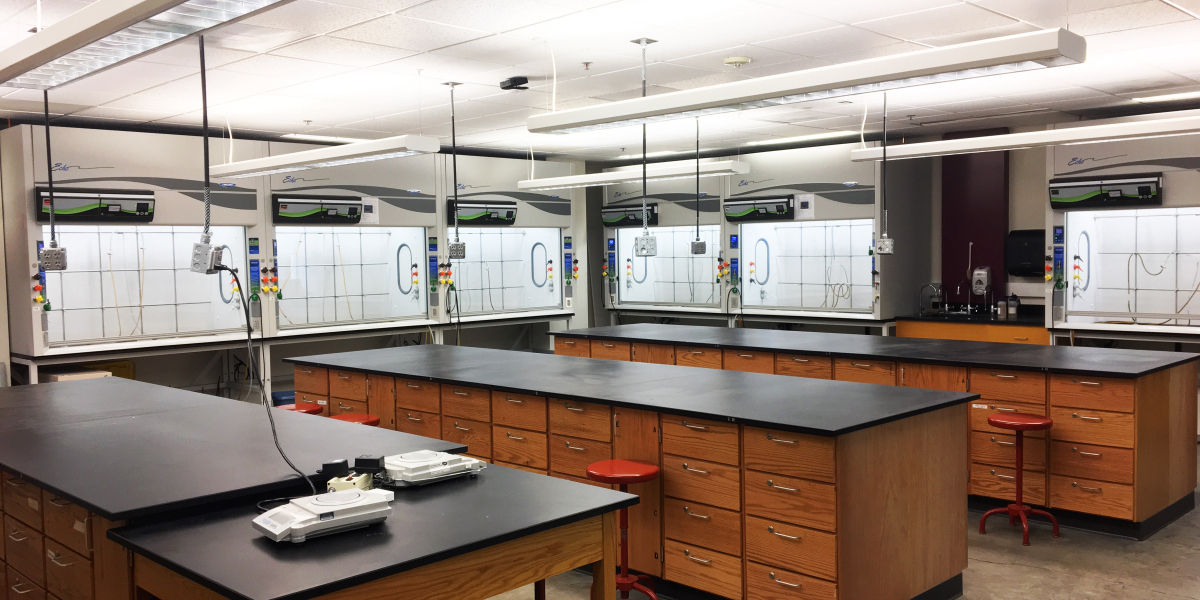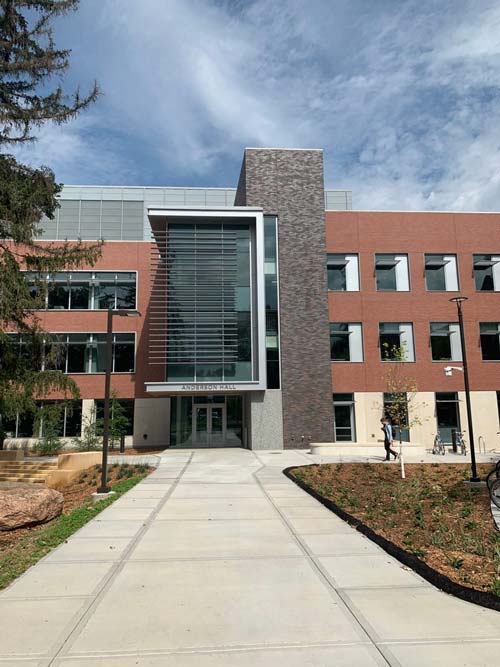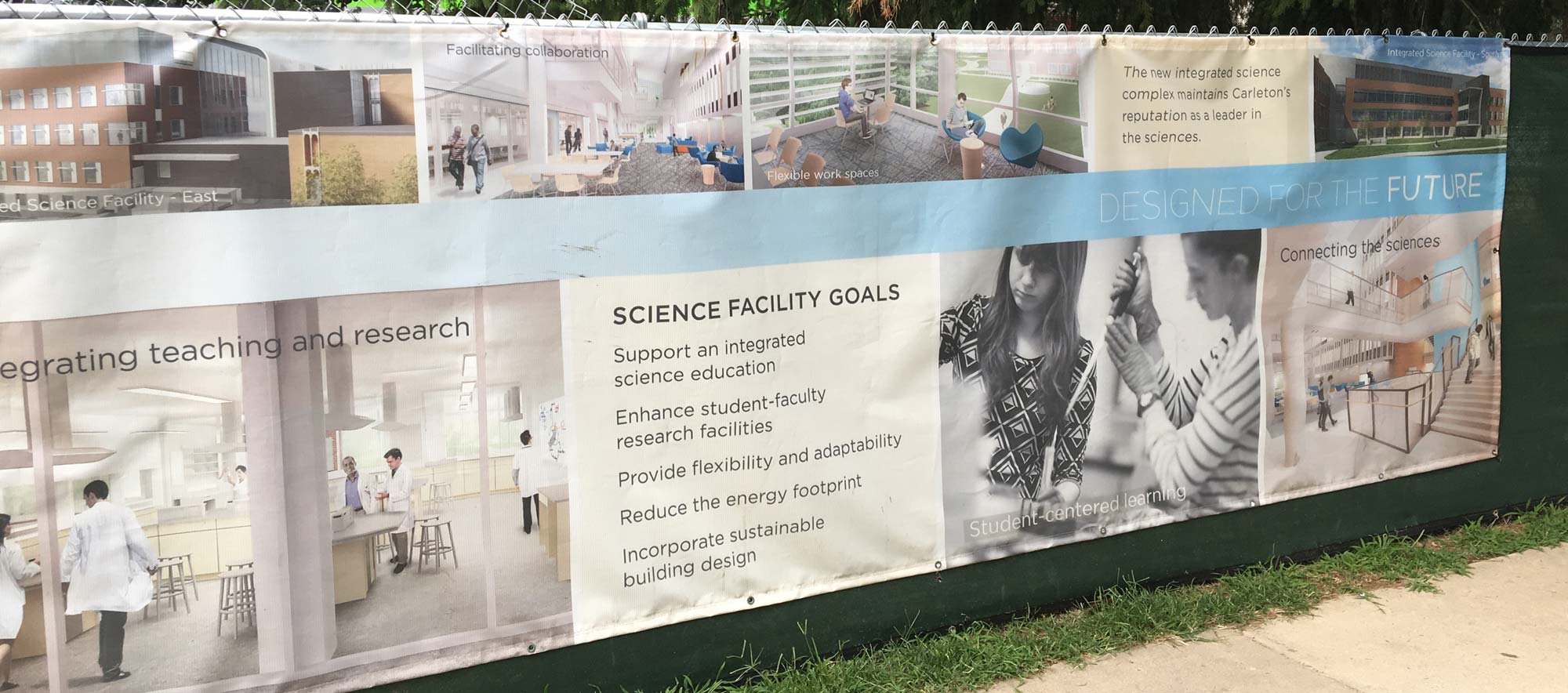Carleton College finds flexibility, safety in filtered fume hoods

In the fall of 2019, Carleton College opened the doors to its new Integrated Science Center, now called Anderson Hall. The complex would be the culmination of the new Anderson Hall connecting two existing and renovated buildings, Hulings Hall and Olin Hall. Altogether they would house the science and math departments for a more integrated approach to learning.
 The project had many goals. They wanted to support student-faculty research and integrated science education, enhance the strengths of the current facilities, feature flexible and adaptable spaces, and to be sustainable. Carleton is using the LEED system and working towards platinum level. According to Carleton.edu, the entire facility is designed to have a net zero impact on energy consumption.
The project had many goals. They wanted to support student-faculty research and integrated science education, enhance the strengths of the current facilities, feature flexible and adaptable spaces, and to be sustainable. Carleton is using the LEED system and working towards platinum level. According to Carleton.edu, the entire facility is designed to have a net zero impact on energy consumption.
So when it was time to outfit their new chemistry labs, Labconco had solutions. Our ducted Protector Hoods are high performance, which means they are also highly efficient. Ducted hoods are one of the largest consumers of energy because they vent tempered air to the outside, meaning HVAC systems have to work harder to keep up with the demand of the lab. Labconco hoods’ efficiency helps to lower those costs when application requirements mean traditional ducted hoods can’t be avoided.
"The project team was looking for ways to meet our energy goals for the project, which were very ambitious. We knew filtered fume hoods would save us energy costs and it was a matter of determining where they could work and getting faculty support. We obviously have vented and ducted fume hoods in the science complex as well to meet the teaching needs," says Steve Spehn, Facilities Director, Carleton College.
Students love the new facility as well. “Anderson Hall somehow doesn’t increase Carleton’s overall energy consumption — an incredible accomplishment I can’t quite wrap my head around. But it makes me so proud to go to a school with such a real, responsible dedication to sustainability, especially because I think I someday want to go into sustainable/renewable energy engineering — my school is my own role model!” says Lucas Demetriades, Carleton College Class of 2022.
For the majority of their new fume hoods, Carleton turned to filtered fume hoods, after input from the chemistry department, their chemical hygiene officer, Carleton facilities, and the Dean’s office. Labconco’s Protector Echo and Airo Filtered Fume Hoods cut operating costs by using comprehensive carbon filtration from Erlab to remove chemical vapors from the air and recirculate the clean air back into the lab. This means zero make-up air costs. Overall energy consumption is minimal compared to ducted hoods.
Not only that, but they are also highly flexible. “A driving force in deciding to go with the filtered fume hoods was our need to set up temporary labs for the time between the removal of our old science building and the opening of our new complex. We used the temporary labs for two years,” says David Alberg, Department of Chemistry, Carleton College.
Installing ducted hoods into temporary labs or flex spaces just isn’t practical. It often requires putting in an entirely new HVAC infrastructure. Not only a long process, but a costly one. By not requiring ducting, filtered fume hoods were ideal for Carleton as they transitioned to and from temporary labs and into the new hall. They were able to continue classes uninterrupted without making any changes to their curriculum.

Carleton College outfitted their labs with 11 Protector Echo Filtered Fume Hoods in addition to their ducted hoods and a few glassware washers. Choosing the Echo meant they didn’t have to sacrifice capability for adaptability. Protector Echo hoods are fully-featured with any accessory found on a traditional ducted hood. Because a Chemical Assessment is required before purchase, they were able to ensure the safety of faculty and students would be equal to a ducted hood as well.
In the end, the building and the hoods met the wants and needs of both staff and students at Carleton. “The hoods are now in our new lab and they are continue to work well. The hoods allowed us to keep functioning they way we wanted to, without any compromises to our program, throughout the moving process – and beyond,” says Alberg.

If you have questions about fume hoods or how they can reduce lab energy consumption, contact us.
| chevron_left | Maintaining laboratory equipment during periods of inactivity: Washers & Water Purification Systems | Articles | A new way to wash: CleanWorks OS | chevron_right |





